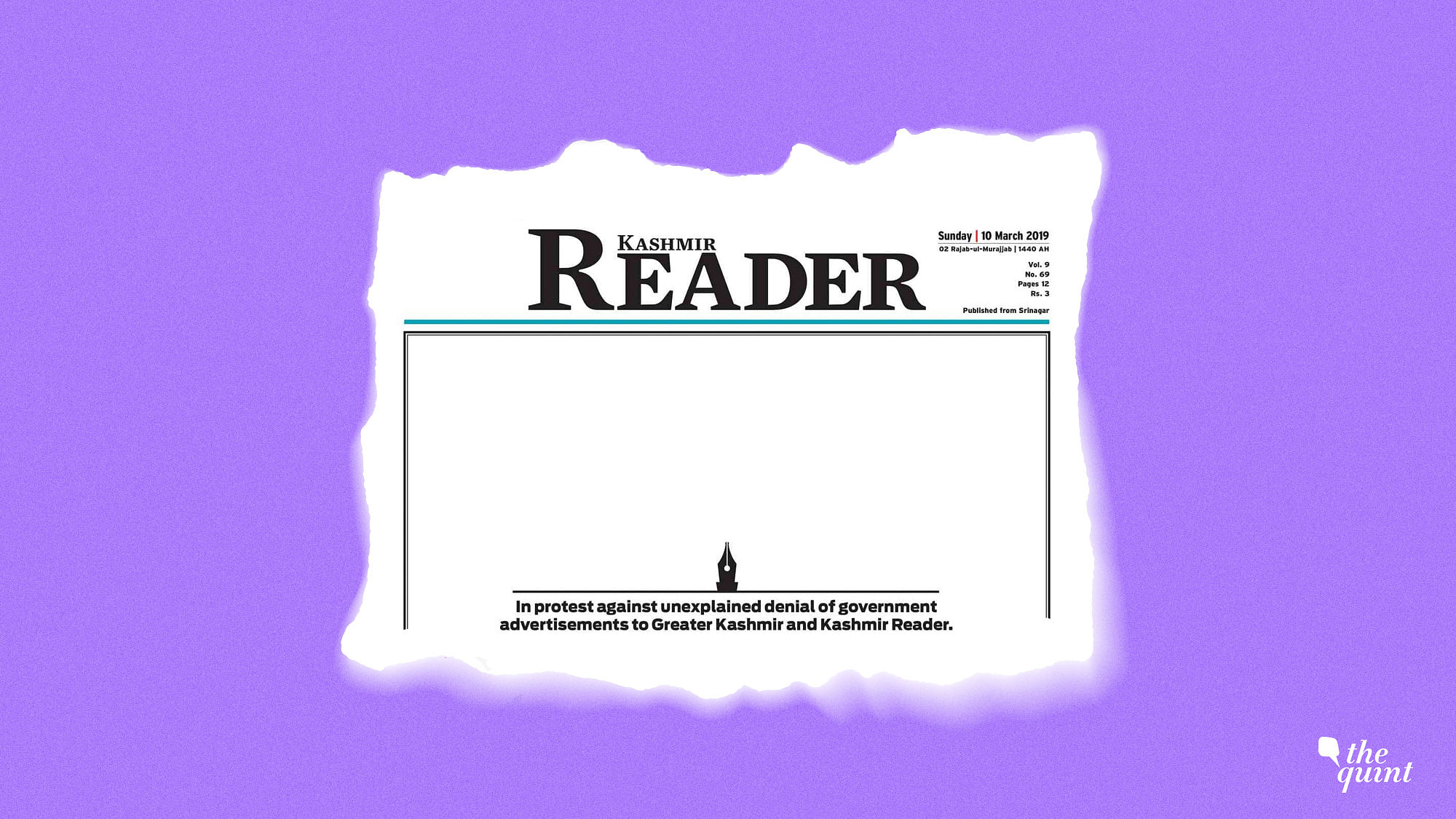Prolonging Ad Ban Will Mean Job Cuts: ‘Kashmir Reader’ Journalist
Amid this ban, journalists with Kashmir Reader & Greater Kashmir expressed fears of job cuts and salary cuts.

advertisement
Video Editor: Mohd Irshad Alam
Video Producer: Furqan Faridi
On 10 March, Sunday, Kashmir woke up to an extraordinary development: five prominent newspapers were carrying blank front pages as a mark of protest against the Jammu and Kashmir administration’s decision to stop publishing official advertisements in two major English dailies.
The front-pages of the newspapers read: “In protest against unexplained denial of government advertisements to Greater Kashmir and Kashmir Reader.”
Rashid Makhdoomi, publisher of Greater Kashmir, the state’s largest English daily, told The Quint:
“Orders from Higher-Ups” for Ad Ban
But that (never carrying a blank front page) changed with the state government’s decision to ‘blacklist’ the two dailies. Since the nearly month-old ban, Greater Kashmir has reduced its edition from 20 pages to 12 pages, while the Kashmir Reader has shrunk from 16 pages to a 12-page edition, according to staff at these two papers.
“There was no communication from the government. When we sough a clarification, the information department told us that they have got orders from higher-ups. My understanding is that the order has come from the state’s home department,” Haji Hayat, publisher of Kashmir Reader said.
Past Instances of ‘Gagging’ Kashmir Media
This is not for the first time that the authorities have used their financial muscle to arm twist the publishers of newspapers from Kashmir who are seen as propagating the ‘anti-state’ narrative. In the aftermath of the 2008 Amarnath land row, a number of newspapers, including Greater Kashmir, were banned from receiving DAVP ads for around three months.
“But this is for the first time that our paper has been blacklisted by the state information department,” Makhdoomi said.
The publication of Kashmir Reader was terminated by the J&K government for nearly three months in 2016, for being ‘critical of India’, saying its publication can ‘incite violence and disturb peace’.
Managing the “Kashmir Valley narrative” is part of the central government’s efforts to bring “peace and stability” to the state. An assessment report by the union home ministry calls for gaining “control of the mosque, madrasa, print and TV media” to end the Kashmir crisis.
Shroud of Uncertainty
The advertisement ban has cast a dark shadow on the newsrooms of Greater Kashmir and Kashmir Reader. Staff of the two dailies contacted by The Quint spoke of “uncertainty”, “salary cuts” and “job loss”. The dailies will lose huge revenue due to the ban, which will reflect in the salaries of middle and lower-rung employees.
According to the staff, the management of the two papers have not yet made any grave announcement, “but given the situation in the Valley, where government advertisements are the primary source of revenue, some heartbreaking moves are expected,” an editor with Greater Kashmir, said.
“There was a rumour (in the newsroom) that salaries will be cut, but it hasn’t happened this month. However, if the government continues with the ban, anything can happen,” another Greater Kashmir journalist said, wishing to stay anonymous.
(Jehangir Ali is a Kashmir-based journalist. He tweets @Gaamuk.)
(At The Quint, we question everything. Play an active role in shaping our journalism by becoming a member today.)